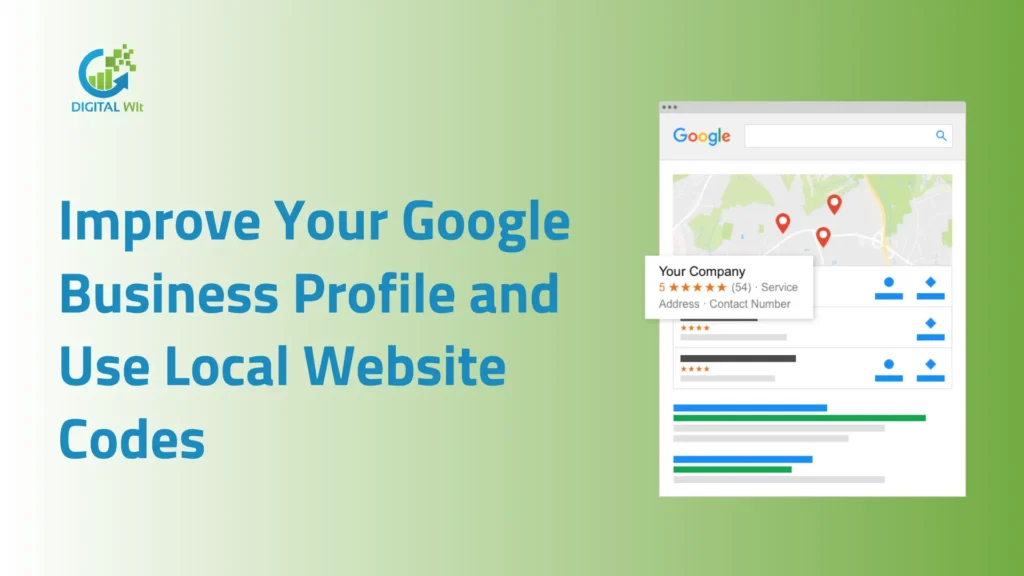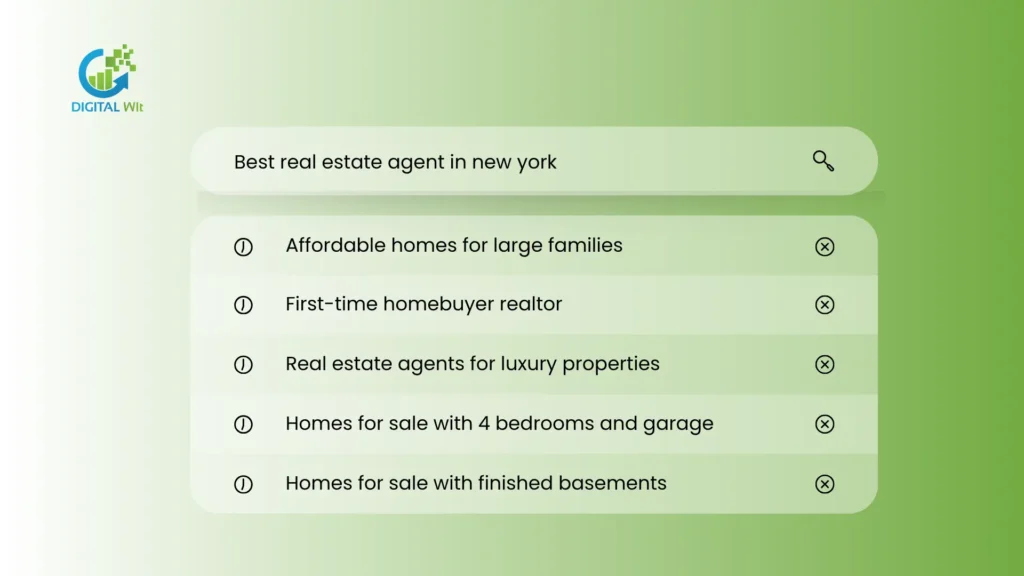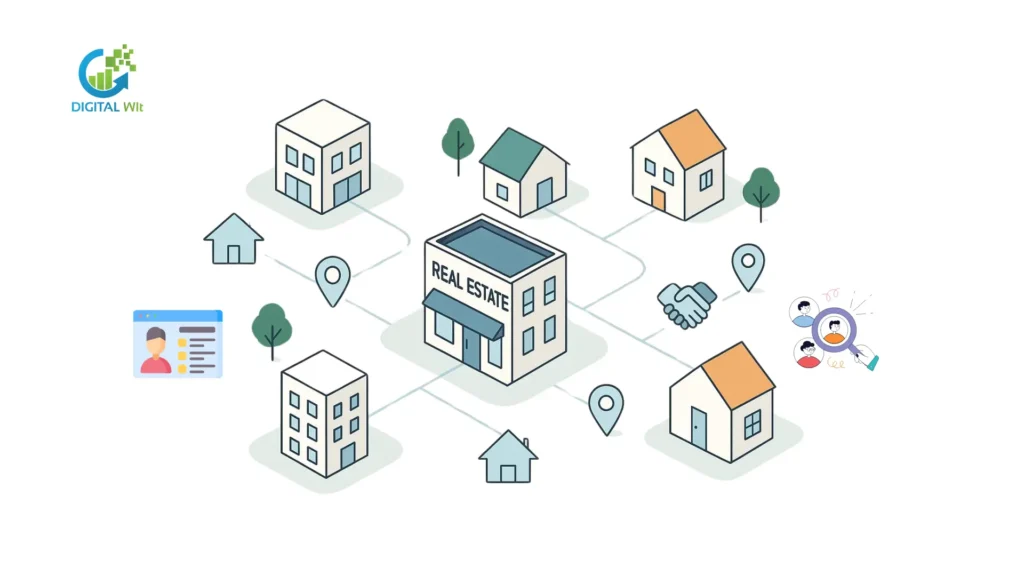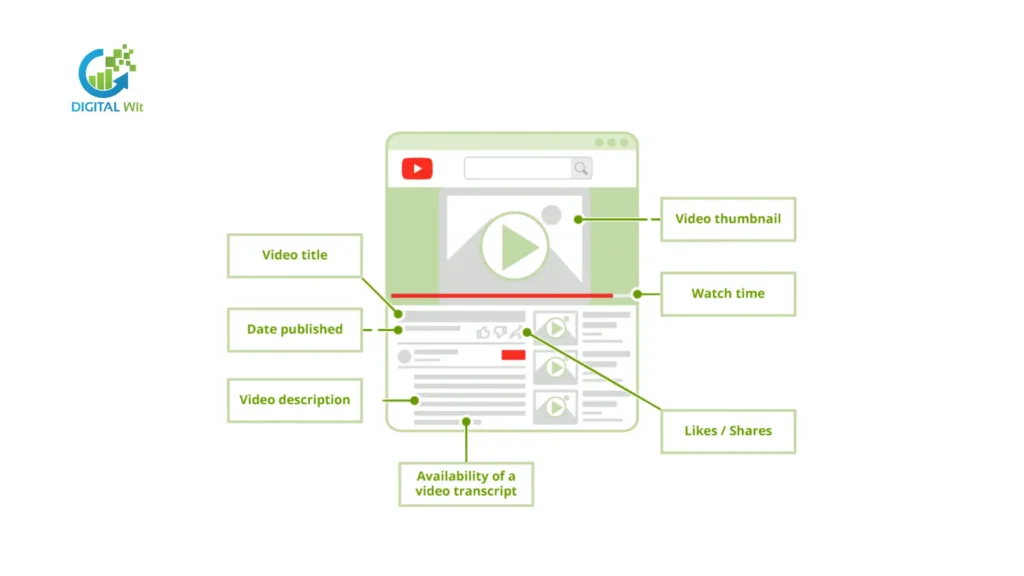
They say if you want to hide something, put it on page two of Google, because no one ever looks there.
In 2026, that’s exactly where you don’t want your real estate listings or business to be buried.
Today’s homebuyers rely on Google more than ever. Whether they’re searching for “best real estate agents near me” or “homes for sale in Dhaka,” it’s local SEO that gets you seen and called.
But here’s the hard truth: just having a website isn’t enough anymore.
With AI-powered search, voice assistants like Siri and Google Assistant, and zero-click answers dominating page one, you need a real strategy to win visibility, traffic, and leads in your market.
We’ve seen this shift firsthand.
Over the past 7 years, we’ve worked with independent agents, large brokerages, and real estate teams.
We’ve helped agents rank on page one for high-intent local searches like “homes for sale in Chattogram” and “top realtors near me.”
Our team and help real estate agents, brokerages, and property businesses:
- Show up on Google
- Get found in local searches
- Attract ready-to-buy or ready-to-sell clients using AI-based local SEO strategies
I’ve optimized over 1,000 real estate websites, built lead funnels with six-figure ROI, and helped agents dominate Google Maps and the Local Pack even in ultra-competitive cities.
Now in 2025, ranking isn’t just about keywords.
It’s about context, authority, entities, NLP, and intent. The rules have changed, but the opportunity to win has never been greater.
This guide breaks down the top 10 local SEO strategies real estate agents need to stay ahead, rank higher, and attract more clients in today’s AI-driven search landscape.
Why Local SEO for Real Estate Businesses is More Important Than Ever in 2026
- 90% of homebuyers start their search online before calling an agent.
- Google now uses AI to rank search results based on user intent.
- Voice searches are growing people ask Google Assistant things like, “Who’s the best realtor near me?”
- EEAT (Expertise, Experience, Authority, Trustworthiness) is now key for ranking higher on Google.
When someone searches for real estate, video results are becoming more common. To stay ahead, you must optimize your content with SERP optimization best practices.
Successful video SEO includes terms that local clients use when searching for real estate. This helps attract qualified leads and improve engagement.
Focusing on the right local keywords ensures better visibility on Google Maps and local search rankings. Appearing in maps and local search results drives more traffic to your site.
At Local Search Engine Optimization Agency Digital Wit, we use SERP optimization blogging and content marketing to improve rankings.
Don’t overlook local SEO in favor of broader strategies local focus is key!
What This Guide Covers: local SEO for real estate
This guide will give you 10 powerful SEO best practices to help you:
- Rank higher in local search results
- Get more leads from Google
- Beat competitors in your area
Real Estate Local SEO Strategy #1: Conduct an SEO Audit with NLP & AI

Before improving your real estate website, you need to check what’s working and what’s not. An SEO audit helps find problems that stop your website from ranking on Google.
If your site is slow, missing important keywords, or has broken links, Google won’t rank it high.
An SEO audit fixes these issues, making sure your website is easy to find, loads fast, and contains the right keywords for homebuyers looking for real estate services in your area.
Why an SEO Audit is Essential
YouTube is Bangladesh’s second most visited site, with 170M+ visits in August 2025.(Source: Semrush)
Video traffic will keep growing in 2026, so ignoring Video SEO means missing a huge audience.
Optimized videos rank higher on Google, driving more traffic and engagement.
Businesses using Video SERP optimization get more visibility, leads, and sales—stay ahead or get left behind!
1. Finds Website Problems That Hurt Rankings
If your website has slow speed, broken links, or pages that don’t load well on mobile, Google will rank other real estate agencies higher than you.
A good SEO audit checks for these issues and helps fix them.
2. Fixes Keyword & Content Gaps
Sometimes, your website doesn’t include the right search terms people use. For example, if homebuyers search for “best Real estate broker in Sylhet,” but your site only mentions “Sylhet homes,” you’re missing traffic.
An audit helps find and add missing keywords. local keywords and the terms that real estate professionals use are also very critical.
3. Uses NLP (Natural Language Processing) to Match Google’s AI
Google now understands what people mean when they search, not just the words they type.
An SEO audit helps update your website so that it answers common real estate questions, making it easier to rank.
How to Perform an SEO Audit (Step-by-Step)
An SEO audit helps identify issues affecting your website’s search rankings and performance.
It involves checking site speed, mobile-friendliness, content quality, and backlinks to ensure your site is fully optimized.
Regular SERP optimization audits help you stay competitive, improve search visibility, and attract more organic traffic.
By identifying weaknesses and making necessary improvements, you can ensure long-term growth and success for your website.
A real estate SEO work plan can help a business to get more popularity and traffic on the website.
1. Check Your Website’s Ranking with Google Search Console
Google Search Console is a free tool that shows:
- Which pages are ranking on Google
- What keywords do people use to find you
- If Google has trouble reading your website
If a page isn’t ranking well, you may need to update the content or add more keywords.
2. Test Page Speed & Mobile Friendliness
Use Google Page Speed Insights to check if your website loads faster than 3 seconds. If your site is slow, Google won’t rank it high.
- Compress large images
- Remove unnecessary plugins
- Use a faster hosting service
3. Find Missing Keywords with professional tools like SurferSEO
Tools like SurferSEO scans top-ranking pages and finds SEO keywords you’re missing. This helps you:
- Add popular real estate keywords to your website
- Include questions homebuyers ask
- Improve real estate industry related headings, descriptions, and content
4. Analyze Your Competitors Using Ahrefs or SEMrush
- Your local real estate market competitors might be ranking higher because they have more backlinks, better keywords, or faster websites.
- Use Ahrefs or SEMrush to see what SEO keywords they rank for.
- Find high-ranking websites linking to your competitors and try to get similar backlinks.
An SEO audit is like a health check for your website. If your site is slow, missing important keywords, or doesn’t match Google’s AI ranking system, it won’t appear on page one.
Running a SERP optimization audit fixes these problems, helping your real estate business rankings upgrade and attract more buyers and sellers.
Real Estate Local SEO Strategy #2: Improve Your Google Business Profile and Use Local Website Codes

If you’re a Real estate broker or business, it’s very important that people nearby can find you online. They may search for real estate services or their unique needs of real estate industry.
One of the best ways to do this is by setting up and fixing your Google Business Profile (also called GBP).
You should also add special website codes called schema to help Google know more about your business.
Why Is Google Business Profile Important?
Most people looking to buy or sell a house start by searching online. In fact, many people use words like “homes near me” when they search.
That means they want results that are close to where they live.
If your Google Business Profile is set up the right way, your business can show up on Google Maps and in the top 3 results on Google.
These spots get the most clicks. So having a strong profile helps more people see your real estate services and call you.
How to Make Your Google Business Profile Better
Google Business Profile (GBP) is a very strong tool for local Search Engine Optimization.
Local SEO focuses on organic searches that people actively searching for property related information.
Here’s a simple checklist to follow:
- Keep your name, address, and phone number (NAP) the same everywhere: Make sure your contact info on Google, your website, Facebook, and other places matches. If the info is different, Google gets confused.
- Add clear photos and videos: Upload bright, clean photos of your office, the homes you sell, and the area you work in. Use photos that show where you are. You can also add virtual tours so people can “walk through” a home online.
- Post every week; Share new home listings, open houses, market updates, or Pro Tips for buyers and sellers. Posting often shows Google your business is active.
- Get reviews and reply to them: Ask happy clients to leave reviews on your profile. Always write back and say thank you. Good reviews help people trust you more and help your profile show up higher in online searches.
Add Special Website Codes (Schema) for Local SEO
Schema markup is a code that helps search engines understand your content better, improving rich snippets, rankings, and visibility in search results.
Schema is a simple type of code you add to your website. It helps Google understand what your business does and where it is.
This can help your website show up better in search results, and sometimes even add special features like star ratings, questions and answers, or business info.
Here are the best schemas for real estate:
- Real Estate Agent Schema: This tells Google that you are a real estate expert. It helps your name and services appear in local search results.
- Local Business Schema: This includes your business name, address, phone number, hours, and services. It helps your business show up when people search using voice tools like Siri or Google Assistant.
- FAQ Schema: If your website answers common questions like “How do I sell my house fast?” or “What is a closing cost?”, this schema helps those answers show up right on Google with clickable boxes.
Helpful tools to create schema:
You don’t need to write code yourself. Use easy tools like:
- Merkle Schema Markup Generator
- Schema App
These tools help you create the code and give you steps to add it to your website.
Real Estate Local SEO Strategy #3: Find and Use the Right Real Estate Words

If you want people to find your real estate business online, you need to use the right words on your website. These words are called keywords.
They are the words people type into Google when they are looking to buy or sell a home.
For example, someone might search for “homes for sale in Gulshan-2” or “real estate agent near me” or “Real estate broker near me” or “Property agent near me” etc.
Using the right keywords helps your website show up in higher positions in Google search results.
How Google Understands What People Are Looking For
Google is smart. It doesn’t just look at one word anymore. It tries to understand the full question people are asking.
It looks at the meaning behind the words.
For example, if someone types “affordable homes with big yards in Bashundhara Residential Area,” Google understands they want homes in Orlando that are not too expensive and have a big yard.
Google also pays attention to important things in the search, called entities. These are things like:
- Cities or towns (like “Dhaka” or “Uttara”)
- Types of homes (like “apartments” or “bungalows”)
- Special features (like “near Gulshan school” or “riverside view”)
When you use clear words like these on your website, Google can better match your page to the right people.
Easy Steps to Find the Best Keywords for Your Website
- See what top websites are using: Look at the websites that show up first when you search for things like “homes for sale in [your city].” Check what words they use often. You can copy the most useful ones.
- Use related words: Don’t just use one keyword over and over. Use other words that mean something similar.
For example, if your main word is “buy a house,” you can also use “home buying Pro Tips,” “how to get a mortgage,” or “real estate help.”
- Try free tools to get ideas: Some tools can help you find smart keywords:
- LSIGraph.com – type in one keyword and it gives you many related ones.
- SurferSEO – shows what words are used by top websites.
- LSIGraph.com – type in one keyword and it gives you many related ones.
These tools help you find words that are already working for others.
- Use keywords in the right places: Once you have good keywords, put them in the important spots on your website:
- The title of your page (what people see on Google)
- Your headings (like the big bold titles on each section)
- Your URL (the website link)
- Your page summary (the short part people read before clicking)
- The title of your page (what people see on Google)
For example, instead of saying “My Listings,” a better title is “3-Bedroom Homes for Gulshan-2.”
Using the right words in the right places helps Google understand what your website is about.
Then it can show your site to people who are looking for homes or real estate help in your area.
Real Estate Local SEO work plan #4: Make Your Website Fast and Easy to Use on Phones

If someone visits your real estate website and it takes too long to load, they will probably leave.
Most people don’t want to wait. They want websites to load quickly and work well, especially on their phones.
That’s why your website must be fast and easy to use on all devices, especially mobile phones.
A slow or hard-to-use site can make people go to a different real estate agency.
Implementing SERP optimization strategies for real estate is essential for increasing visibility and attracting potential buyers.
Start by listing your business in local directories to enhance credibility and improve rankings.
To improve your local SEO, focus on optimizing your website with local SEO keywords that match buyer search intent.
Strengthen your local Online search optimization efforts by engaging with community-based content and earning backlinks from a local expert in the industry.
High-quality Search marketing content with targeted keywords for real estate can drive organic traffic and improve conversion rates.
A well-planned approach ensures successful Online search optimization, helping real estate businesses dominate local search results.
Why Does Website Speed Matter?
Speed is very important. If your site is slow, people won’t stay.
In fact, over half of users are likely to leave a website if it takes more than 3 seconds to load.
That means you lose visitors before they even see what you offer.
Google also checks how your site works on phones first. This is called Mobile-First Indexing.
If your site loads slowly or is hard to use on a phone, Google may not show your website to people in search results.
So, a fast, mobile-friendly site helps you Move up in search results and get more traffic.
How to Make Your Website Faster and user-friendly on Phones
Here are five simple ways to improve your website’s speed and mobile experience:
- Only load images when needed (lazy loading): Most real estate sites have many photos. But your website shouldn’t load all of them at once.
With lazy loading, pictures show up only when someone scrolls down to them. This helps your page load faster at the start.
- Make pictures smaller without losing quality: Large pictures slow your site down. Use free tools like TinyPNG to shrink image sizes.
Also, save pictures in WebP format, which loads faster than old types like JPG or PNG. This helps your pages open faster, especially on phones.
- Use a CDN (Content Delivery Network): A CDN like Cloudflare stores copies of your website on different servers around the world.
When someone visits your site, the nearest server shows the page. This makes your site load quicker no matter where the person is.
- Use AMP for mobile pages: AMP (Accelerated Mobile Pages) makes your website very fast on phones. It removes extra things that slow down the page.
AMP pages open quickly and give users a better experience, especially if they are using slow internet.
- Test your site speed and fix issues: Use free tools to see how fast your site is and what needs to be fixed:
- Google PageSpeed Insights – gives your website a speed score and Pro Tips to improve.
- GTmetrix – shows what parts of your site are too slow.
- Lighthouse (built into Chrome browser) – checks speed, mobile design, and more.
- Google PageSpeed Insights – gives your website a speed score and Pro Tips to improve.
These tools are easy to use. Just enter your website link, and they’ll give you a report.
A fast, mobile-friendly website helps more people stay longer, look at your listings, and contact you. It also helps you show up higher on Google.
If your site is slow or hard to use on a phone, you could be losing buyers and sellers without even knowing it.
Real Estate Local SEO Strategy #5: Use Local Content and Personalized Pages

If you want more people in your area to find your real estate business online, you need to write about your local community.
That means talking about neighborhoods, schools, parks, restaurants, and what it’s like to live there.
This is called hyper-local content, and it helps your website appear when people search for homes or real estate information in your city or town.
By getting specific with your content, you can attract the right buyers and sellers—and rank higher on Google!
What is Hyper-Local Content?
Hyper-local content focuses on small areas instead of big cities or general topics. Instead of saying, “Homes for Sale”, a better option would be:
- “Best Waterfront Homes for Sale in Dhaka Lakefront (2026)”
- “Top 5 Family-Friendly Neighborhoods in Uttara, Dhaka”
- “Condo Living in Banani: What to Know Before You Buy”
This way, Google knows exactly what your page is about, and local buyers searching for homes in those specific areas will find your website.
How to Create High-Ranking Local Content
To create high-ranking local content, use local SEO keywords and cover area-specific topics.
Create detailed articles about local market trends, neighborhoods, and property insights. Optimize with your office address and the real estate locations you serve.
Adding local backlinks boosts credibility. Engaging, valuable content helps you rank higher in search results. Want to Improve rankings on Google and get more local buyers? Here’s how to do it:
1. Write Neighborhood Guides
People love learning about different neighborhoods before they move. Create detailed guides that include:
- Home Styles & Prices – What types of homes are available? What’s the price range?
- Schools – Are there good elementary, middle, and high schools nearby?
- Parks & Outdoor Spaces – Are there any trails, lakes, or playgrounds?
- Restaurants & Shopping – Where are the best coffee shops, grocery stores, and malls?
- Vibe & Community – Is it quiet and family-friendly, or lively with nightlife?
Example: “Why Families Love Living in Dhanmondi: A Complete Guide”
Pro Tip: Add real photos, maps, and videos to make your content more engaging!
2. Share Local Market Updates
Home buyers and sellers always want to know:
- Are home prices going up or down?
- How long do homes stay on the market?
- Is it a buyer’s or seller’s market?
Each month, publish real estate market updates using MLS data. A simple post could look like this:
“In 2025, the average price of a 2-bedroom apartment in Dhaka was approximately around BDT 3,800,000.(Source:bikroy.com)
This helps you build trust as the go-to local real estate expert.
Pro Tip: Use graphs and charts to make data easier to understand!
3. Answer Common Buyer & Seller Questions
People turn to Google for real estate advice. Answer their biggest questions with blog posts like:
- “Is Now a Good Time to Buy a Home in Dhaka?”
- “5 Mistakes First-Time Homebuyers Make in Bangladesh (and How to Avoid Them)”
- “What to Know Before Selling Your Home in 2026”
By answering questions, you attract visitors to your site and establish yourself as an expert.
Pro Tip: Use simple language to explain things like you’re talking to a friend!
4. Use SEO Tools for Smart Topic Ideas
You don’t have to guess what to write about. Use Online search optimization tools like:
- SEMrush – Keyword Research & Topic Cluster
- Surfer seo – Content Optimization
- Google’s “People Also Ask” – Shows real questions people are searching for
For example, if people in Miami are searching for “Best Gated Communities in Dhaka”, write a blog post about it!
Pro Tip: Keep your content fresh by updating old posts with new info!
5. Create Location-Specific Pages
Instead of one general “Homes for Sale” page, create multiple pages for different areas, like:
- “Luxury Homes for Sale in Dhaka”
- “New Construction Homes in Sylhet”
- “Best Starter Homes Under ৳40 Lakh in Dhaka”
These pages help Google match your site to what people are actually searching for.
Pro Tip: Add real listings on these pages to make them more useful!
Using hyper-local content and personalized pages is one of the best ways to Move up in search results on Google and attract serious home buyers.
- Write neighborhood guides
- Share market updates
- Answer common real estate questions
- Use SEO tools for smart topics
- Create area-specific pages
The more specific and helpful your content is, the more local buyers and sellers will find you!
Start today, Pick one neighborhood and write your first hyper-local guide!
Real Estate Local SEO Strategy #6: Build High-Authority Backlinks & Local Citations

Imagine you’re looking for a new restaurant. You check Google, and the top result has lots of great reviews and is mentioned in food blogs. You’d probably trust it more than a place with no reviews, right?
The same thing happens with real estate websites. Google trusts websites that have strong backlinks and local citations.
The more trusted websites mention or link to your business, the higher you’ll rank in search results. That means more buyers and sellers will find you online!
Why Backlinks & Citations Matter?
Want your real estate website to rank high? Building local authority through backlinks and local citations is the key. At Digital Wit, we help businesses gain local backlinks and improve rankings.
Learn more about our SEO services to get started today!
A strong real estate Search ranking strategy is essential for reaching potential buyers and sellers. Using local SEO for real estate ensures your videos appear in search results.
To run a successful SEO campaign, focus on related keywords for real estate that match what people search for. Local Search ranking strategy optimizes your online presence by boosting visibility in local searches.
Backlinks Help You Rank Higher on Google
A backlink is a link from another website to yours. It’s like a recommendation. When high-quality websites link to your site, Google sees it as a sign of trust and ranks your page higher.
But not all backlinks are equal. Links from trusted sources (like real estate blogs, news websites, or financial sites) help your rankings much more than links from random, low-quality websites.
For example, if a well-known real estate blog links to your article on “The Best Neighborhoods for Families in Gulshan-2”, Google will see your website as an authority on Gulshan-2 real estate.
Local Citations Boost Your Google Business Profile
A local citation is when your business name, address, and phone number (NAP) appear on business directories, real estate websites, and local listings.
Local SEO can be tricky but these citations help Google confirm that your business is real and trustworthy.
Some common places where real estate businesses should have citations include:
- Google Business Profile
- Bproperty.com
- Bikroy.com (Real Estate Section)
- Local business directories like Bangladesh Business Directory
- Local Chamber of Commerce websites or city-based trade directories
If your information is consistent across these sites, Google will rank your business higher in local searches. This will help real estate websites Improve their rankings in the Google search results.
How to Get Backlinks for Real Estate SEO?
Boost your search rankings by building local authority through backlinks from trusted sites, directories, and blogs. You need to follow a proper real estate seo strategy. Quality real estate SEO backlinks drive traffic!
Earning good quality SEO backlinks takes effort, but it’s one of the best ways to boost online search optimization. Here’s how to do it:
Guest Post on Real Estate Blogs & Finance Websites
Many real estate blogs and financial websites accept guest articles from industry experts. Writing articles about local search terms for these websites gives you exposure and a valuable backlink.
Example guest post ideas:
- “5 Mistakes First-Time Homebuyers Make”
- “How to Choose the Right Mortgage in 2026”
- “The Future of Real Estate: What Buyers Need to Know”
Find real estate websites that allow guest posts and pitch them your ideas. In return, they’ll link to your website in the article.
Partner with Mortgage Lenders & Home Inspectors
Form partnerships with mortgage lenders, home inspectors, and real estate attorneys to create content together.
Ways to collaborate:
- Write a joint blog post (Example: “How to Get Pre-Approved for a Mortgage Before House Hunting”)
- Record a video interview and share it on your websites
- Feature each other in newsletters and social media posts
These partnerships help you build trust, reach more people, and get strong backlinks.
Get Press Mentions with HARO (Help A Reporter Out)
Reporters and bloggers always need expert opinions for their articles. HARO (Help A Reporter Out) is a free tool where you can answer real estate-related questions from journalists.
If they use your response, they’ll mention your name and link to your website in their article.
Getting featured on major sites like Forbes, Business Insider, or Realtor.com can boost your credibility and your Google rankings.
Use SEO Tools to Find More Backlinks
SEO tools help you find websites that link to your competitors so you can try to get links from the same sources. Some of the best tools include:
- BrightLocal – Helps you build and manage local citations.
- Ahrefs – Shows which websites link to your competitors.
- Moz Local – Helps keep your business listings accurate.
By using these tools, you can track your progress and find new backlink opportunities.
Building high-quality backlinks and local citations is one of the best ways to improve your real estate SEO. Here’s a quick recap:
- Write guest posts for real estate and finance websites.
- Partner with mortgage lenders and home inspectors for content.
- Use HARO to get featured in major news articles.
- Use SEO tools to track and build backlinks.
Backlinks and citations take time to build, but they pay off in the long run.
The more trusted sources mention your business, the higher your website will rank and the more buyers and sellers will find you online!
Real Estate Local SEO Strategy #7: Optimize for AI-Powered Search & Voice Queries

Imagine asking your phone, “What’s the best neighborhood to buy a home in Dhaka?” and getting a quick, spoken answer instead of clicking on a website. This is the future of search.
AI-powered search and voice assistants like Google Assistant, Siri, and Alexa are changing how people find real estate information.
If your website isn’t optimized for these new search trends, you could be missing out on buyers and sellers who prefer quick, spoken answers.
Why is AI Search Changing SEO?
AI search is transforming Online search optimization by prioritizing context, intent, and conversational queries over traditional keyword matching.
With AI-driven algorithms like Google’s SGE (Search Generative Experience), results are more personalized, reducing reliance on traditional rankings. Businesses must focus on high-quality, authoritative content and structured data to stay competitive in search visibility.
Google’s SGE (Search Generative Experience) is Reshaping Rankings
Google is no longer just showing links in search results. With SGE (Search Generative Experience), Google now gives AI-powered answers right at the top.
That means:
- Your website needs to answer questions directly so Google can pull from it.
- AI prefers clear, factual, and structured content over long, complicated text.
This means writing quick, easy-to-read content for real estate brokers that directly answers common home buying and selling questions.
Voice Search & Conversational Queries are Growing
More people are using voice search to find homes, real estate marketing agents, and market updates. Instead of typing, they ask full questions, like:
- “How much does a home in Dhaka cost?”
- “Who is the best real estate agent near me?”
- “Is now a good time to sell my house?”
These searches are more natural and conversational, so your website needs to match that tone.
How to Optimize for AI & Voice Search
Can you relate that AI and voice search are changing the way people find information online? Instead of typing short queries, users now ask complete questions in a natural, conversational tone.
To stay ahead, businesses must optimize their content for how people speak, not just how they type.
Use FAQ Schema for Direct Answers in Google Assistant & Siri
FAQ schema is a simple code that tells Google what questions your website answers. This helps your content appear in voice search results and AI-generated answers.
For example, if you write a blog post on “How to Buy a Home with No Down Payment”, adding FAQ schema can help your content appear as a direct answer in Google Assistant or Siri responses.
Pro Tip: Use structured FAQ sections at the end of your blog posts with common real estate questions.
Focus on Question-Based Long-Tail Keywords
Most AI and voice searches are full sentences, not short keywords. Instead of just “real estate agent”, people say:
- “How do I find a real estate agent near me?”
- “What are the safest neighborhoods in Gulshan-2?”
- “Can I buy a house with bad account balance?”
Your content should match these natural questions so that AI-powered searches pick up your website.
Pro Tip: Use tools like AnswerThePublic and Google’s “People Also Ask” to find real questions people search for in your area.
Write Concise, Conversational Content for Featured Snippets
Featured snippets are the short text boxes that appear at the top of Google when you ask a question. AI-powered search often pulls answers from these snippets.
To get featured:
- Answer questions in the first few sentences of your blog posts.
- Use bullet points and short paragraphs for easy scanning.
- Write like you’re talking to a friend, keep it simple and clear.
Example – Instead of: “Buying a home in Dhaka can be a complex process, but with the right strategy, you can find a property that meets your needs.”
Try: “Want to buy a home in Dhaka? First, check your credit score, get pre-approved for a mortgage, and choose the right neighborhood.”
The future of Online search optimization is about clear, helpful answers.
If your website provides quick, conversational, and valuable information, AI will favor your content and more buyers and sellers will find you!
Real Estate Local SEO Strategy #8: Use Video SEO & Virtual Tours to Rank Higher

More home buyers are searching online before visiting a property. They want to see a home before they step inside.
That’s why video listings and virtual tours are now a must-have for the real estate business.
Listings with videos and 360° virtual tours get more views, rank on the top positions of Google, and help buyers make faster decisions. If you’re not using them, you’re missing out on more leads and faster sales.
Video content is transforming the needs of real estate businesses, making it essential to optimize for search engines. Buyers and sellers engage more with videos, so ranking high requires strong SEO strategies.
At the best SEO agency Digital Wit, we focus on local SEO services we offer to help real estate businesses gain visibility. SEO services for real estate ensure your listings and videos reach the right audience.
By working with an SEO expert, you can improve rankings and engagement. Digital Solutions is an SEO agency that understands how SEO services help you avoid missed opportunities. Start optimizing today!
Why Video SEO is Critical in 2026
Do you believe that Video SEO will be a game-changer in 2026 ?
With platforms like YouTube and TikTok dominating, search engines prioritize video content more than ever. Optimized videos boost rankings, engagement, and conversions.
AI-driven algorithms now analyze video transcripts, captions, and metadata, making SEO-friendly titles, descriptions, and tags essential.
Google increasingly features videos in search results, driving massive organic traffic.
Plus, voice and visual searches favor rich media over plain text. Short-form and long-form videos are key to capturing attention and keeping users engaged.
If you’re not optimizing for video SEO, you’re missing out on a powerful way to grow your brand!
Video Listings Get More Engagement and Leads (Bangladesh Edition)
Buyers in Bangladesh love video because it helps them experience the property before scheduling a visit. Research and market trends show:
- Property listings with videos get up to 400% more inquiries than those without, especially on platforms like Bproperty, Bikroy, and Facebook Marketplace.
- Viewers spend around 60% more time on listings that include video walkthroughs or short reels — this also helps boost visibility in local search results.
- Homes with virtual tours or video presentations sell nearly 30% faster than those without, particularly in Dhaka, Chattogram, and Sylhet where digital property searches are rising fast
Videos help buyers connect with a home, making them more likely to schedule a showing or make an offer. Hyper-optimized SEO strategies for real estate can take you to the top positions in Google search ranking.
YouTube is the 2nd Largest Search Engine
After Google, YouTube is where people search for real estate tips and property listings. Many buyers search for:
- “Best neighborhoods in Dhanmondi”
- “Affordable homes for sale in Uttara”
- “How to buy a home in 2026”
Google ranks pages with videos higher, so adding videos to your listings and blogs can increase traffic and leads.
If you’re not using local SEO efforts, you’re missing out on potential clients. Video content ranks well, but it needs proper optimization to drive traffic.
Look at other real estate videos that rank high—most use SEO techniques. Traditional SEO content for real estate isn’t enough; video content needs a strategic approach.
At Best SEO agency Digital Wit, we specialize in local SEO services for real estate. From keyword research to video descriptions, we ensure better visibility.
Want to discover your real estate services online? Optimizing your real estate website with video SEO boosts rankings and engagement. Start now!
Real Estate Local SEO Strategy #9: Get More Client Reviews & Build Trust

If you are a real estate agent, getting good reviews from clients is very important. Reviews help new clients trust you, improve your ranking on Google, and make your business stand out.
The more good reviews you have, the more people will want to work with you.
This guide will explain why reviews are important and how you can get more of them for your real estate business.
Why Online Reviews Matter for Local estate agent
Online reviews are like word-of-mouth recommendations. When people search for a real estate agent, they check reviews to see if others had a good experience with you.
More positive reviews help your business grow.
1. People Trust Online Reviews Like Personal Recommendations
A study found that most people trust online reviews as much as a recommendation from a friend.
If someone sees good reviews about your business, they will feel safe choosing you. A strong review can convince a potential client to contact you.
2. Google Ranks Businesses with More Good Reviews Higher
Google wants to show the best businesses at the top of search results. One way Google decides which business is the best is by looking at how many good reviews it has.
If your business has a lot of recent, positive reviews, Google will show your name higher in search results.
3. More Reviews Help You Beat the Competition
If two real estate agents are in the same area, but one has 100 five-star reviews and the other has only 10 reviews, most people will choose the one with more reviews.
Having a lot of reviews makes you look more experienced and trustworthy.
4. Reviews Bring More Clients for a real estate agent
When people see a real estate agent with good reviews, they are more likely to call or message them. This means you will get more business without spending extra money on ads.
How to Get More Reviews for Your Real Estate Business
Getting more reviews is simple if you follow the right steps. Here’s what you need to do:
1. Ask Happy Clients for Reviews
Many clients will leave a review if you ask them. The best time to ask is right after closing a deal, when they are happy and excited.
You can say:
“I really enjoyed helping you find your home! If you have a minute, could you leave a review on Google? It helps me a lot!”
Pro Tip: Always provide a direct link to make it easy for them.
2. Send Review Requests by Email or Text
Some clients forget to leave reviews, so a simple reminder can help.
Example Email:
Subject: Quick Favor – Can You Leave a Review?
Hi Den,
I’m so happy I could help you with your home! If you have a moment, I’d love for you to leave a review on Google. It helps future buyers and sellers find me. Click here to leave a review: [Insert Link].
Thank you!
Best Regards
Kamrul Hassan
Pro Tip: Keep your message short and friendly.
3. Respond to Every Review (Good or Bad)
Replying to reviews shows that you care about your clients.
- For good reviews, say thank you. Example:
“Thank you, Sarah! It was great working with you. I wish you happiness in your new home!” - For bad reviews, stay professional and try to fix the problem. Example:
“I’m sorry you had a bad experience. I’d love to talk and make things right. Please contact me at [your email/phone].”
A good response can turn a bad review into a chance to show great customer service.
4. Make It Easy to Leave a Review
Put a “Leave a Review” button on your website, email signature, and social media pages.
Example:
“Happy with my service? Please leave a quick review here: [Insert Link]”
The easier you make it, the more reviews you will get.
5. Thank Clients for Leaving Reviews
Show appreciation when clients leave a review. You can:
- Send a thank-you email.
- Mention their review in your newsletter or social media.
- Send a small thank-you card in the mail.
This makes clients feel valued and encourages more people to leave reviews.
Reviews help your real estate business get more clients, Move up in search results on Google, and build trust.
- Ask happy clients to leave reviews.
- Send email or text reminders.
- Respond to all reviews.
- Make it easy to leave a review.
- Thank clients for their feedback.
If you follow these steps, your real estate business will stand out from the competition and attract more clients!
Real Estate Local SEO Strategy #10: Stay Ahead with 2026 SEO Trends
Google is making big changes to how people find real estate online. In 2026, AI-powered search, trusted businesses, and virtual home tours will be more important than ever.
Real estate agents need to adjust their SEO best practices now if they want to attract more buyers and sellers.
1. Google’s AI Will Answer Questions Before People Click on Websites
Google is using AI (artificial intelligence) to give people quick answers to their questions. Instead of just showing a list of websites, Google now displays direct answers at the top of the search page.
This means that fewer people may visit websites because they already found their answer on Google. If real estate agents want to get more website visitors, they need to write short and clear answers that Google will show in search results.
What This Means for You
If your website does not provide fast and simple answers, Google will not show it to people searching for real estate information.
People searching for real estate questions, like “How much do real estate agents charge?” or “How do I sell my house fast?”, will see answers directly on Google. If your website is one of the sources Google uses, you will get more visitors.
What You Can Do
- Add an FAQ (Frequently Asked Questions) section to your website with common real estate questions.
- Keep answers short and clear so Google can feature them at the top of search results.
- Use bullet points and simple sentences to make answers easy to read.
For example, instead of writing a long paragraph, write something like this:
Q: How much do real estate agents charge?
A: Most agents charge 5-6% of the home’s selling price.
This format makes it easy for Google to pick up your answer and show it in search results.
2. Google Will Trust Experts More (EEAT Ranking)
Google wants to rank trusted and experienced real estate agents at the top of search results. To decide if a website is trustworthy, Google looks at something called EEAT:
- Experience – Do you have real estate knowledge and experience?
- Expertise – Do you provide helpful and correct information?
- Authority – Do other trusted websites mention your name or business?
- Trust – Do your clients leave positive reviews?
If your website does not prove that you are an expert, Google may rank it lower than other real estate agents who have more experience and trust.
What This Means for You
If you do not show your experience and trustworthiness on your website, Google will not recommend your business to people searching for a real estate agent.
Websites with more positive reviews, expert content, and backlinks (links from other trusted websites) will Improve your rankings.
What You Can Do
- Create an “About Me” page with your experience, credentials, and awards.
- Ask happy clients to leave reviews on Google, Zillow, and Yelp.
- Get mentioned in news articles, real estate blogs, and local business directories.
For example, if a local newspaper writes about your business and links to your website, Google sees this as a sign of trust, and your ranking will improve.
3. Virtual Tours & Videos Will Improve Google Search Rankings
More buyers want to see homes online before scheduling a visit. Instead of just looking at photos, buyers now prefer virtual tours, 3D home views, and video walkthroughs.
Google is now ranking real estate websites with video content higher than those without it.
What This Means for You
If your listings only have pictures and text, they might not rank well in Google search results. Buyers are more likely to visit websites that offer virtual home tours and video walkthroughs.
Google also favors websites with videos because they keep visitors engaged for longer.
The longer people stay on your website, the better it will rank in search results.
What You Can Do
- Add virtual home tours to your property listings so buyers can explore homes online.
- Upload video walkthroughs of your listings to YouTube and embed them on your website.
- Use 360-degree photos so buyers can look around rooms before visiting in person.
For example, instead of just posting pictures, record a 2-minute video walkthrough where you explain the best features of the home.
Buyers will feel like they are walking through the property, making them more likely to contact you.
SEO is changing, and real estate agents must adapt to stay ahead. Google is focusing more on AI-powered search results, trusted experts, and virtual content.
To make sure your business ranks high on Google in 2025, follow these steps:
– Answer common real estate questions shortly and clearly.
– Show your expertise by getting reviews, writing useful content, and getting mentioned on other websites.
– Use virtual tours and video content to attract more buyers and stand out from competitors.
By making these changes now, your business will be ready for the future and attract more clients in 2025!
Strengthen your real estate seo in 2026
Your real estate business is trustworthy, but without strong SEO, potential clients may not find you. A well-optimized website builds credibility and attracts more leads.
You’ve probably heard of traditional SEO, but modern real estate marketing requires more. Video content, local optimization, and user-friendly design make a big difference.
Don’t favor broader marketing strategies at the cost of local visibility. Targeted real estate SEO ensures you reach the right audience.
Include your office address and the real estate locations you serve. Optimizing your address and the real estate content improves search rankings and builds trust.
Create detailed articles about local property trends, neighborhoods, and market insights. Informative content keeps visitors engaged and boosts SEO.
























